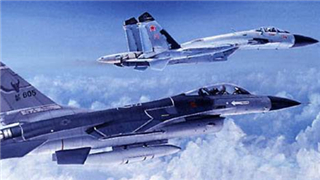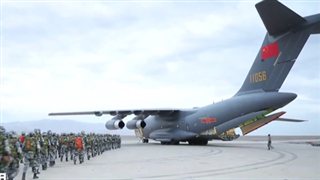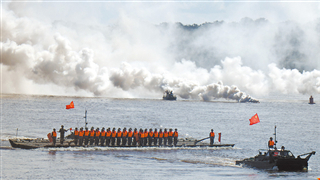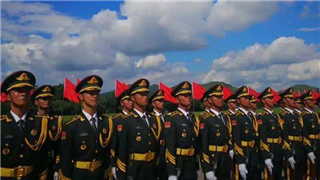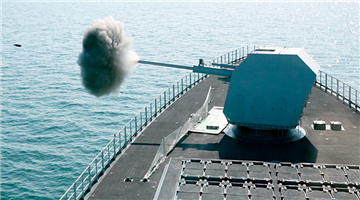By Lian Degui
Japanese defense minister Taro Kono met with his American counterpart Mark Esper in Hawaii on August 29, the second day of Japanese Prime Minister Shinzo Abe’s announcement of his resignation. Soon afterward, Abe held talks with Donald Trump over the phone on August 31 about how to cope with the military threats from China. How the Japan-US military cooperation will proceed in the post-Abe age has captured close attention.
The military ties between Tokyo and Washington have seen some changes recently. On the one hand, both sides want to use China as the excuse to deepen bilateral military cooperation; on the other hand, Japan has unusually and bewilderingly canceled several weapon orders with the US.
Japan’s weapon purchase from the US is all through America’s Foreign Military Support (FMS) program. It has found itself plenty of reasons to cancel the orders - the Aegis Ashore missile systems have safety hazards. Still, the US demanded an additional 200 billion Japanese Yen for providing the rectification data and the systems , which, however, wouldn’t be delivered until 12 years later. What infuriates Japan even more is that the American interception system has long become outdated, given the remarkable progress in China and DPRK’s missile technology.
Moreover, a Global Hawk unmanned aerial vehicle (UAV) was shot down by Iran in June 2019, and it is useless in the face of China’s immense air defense capability. Yet, the US had the nerve to demand a 23% price hike from Japan. Japan doesn’t want to waste its defense budget on buying outdated and ineffective defense systems because that affects the development of the Japanese military industry, said ex-Japanese Defense Minister Gen Nakatani.
Washington demanded Japan to buy its military equipment to balance the trade deficit. Trump asked Abe to buy the Aegis Ashore missile systems during his visit to Japan in 2017, apart from asking Tokyo to bear USD8 billion expenses for the stationed American troops.
Japan has an annual defense budget of about USD50 billion, most of which is spent on buying American military supplies and weapons, with an extra “care budget” for the stationed American troops every year. Trump, who is trying hard to win the re-election, once bragged about the tremendous amount of weapon export during his first term, and Japan’s termination of weapon purchase from the US before the election in November will tarnish Trump’s performance sheet.
Washington doesn’t care who is in power in Tokyo as long as the Japan-US relation, especially their military cooperation, isn’t affected, and the interests of American troops stationed in Japan are not harmed.
Such a large volume of military deals is hard to come through without the excuse of threats from foreign countries. The talks between Taro Kono and Mark Esper focused on China’s ocean entry and exit and its so-called unilateral attempt to change the status quo in the East and South China Seas by force and coercion, and Abe and Trump also discussed over the phone how to cope with the situation in the two waters and the alternative measures in replacement of land-based Aegis system.
The recent hype of China’s launch of two missiles by foreign media also became gold for the “China threat theory” concocted by Tokyo and Washington, who said close attention has to be paid as one of the missiles can reach Guam. At the same time, the other can destroy the American aircraft carrier.
Regarding missile defense, Japan not only stresses the threat from DPRK but also China. The problem now is not the deployment of Aegis Ashore missile systems, but how to attack the enemy base. However, this kind of preemptive attack may violate Japan’s pacifist Constitution and break its “exclusively defense-oriented” principle. Therefore, some Japanese politicians proposed that Japan will not wage war, but should take precautions against possible attacks for its own security, thus making its “self-defense” legitimate and giving it the excuse to make preemptive offensives at enemy bases. In other words, Japan wants to launch attacks but doesn’t want to bear the responsibility for aggression, which cannot help but remind us of the “September 18 Incident” and the “Lugou Bridge Incident.”
After pulling out of the INF Treaty, the US made clear that it would resume the deployment of intermediate-range missiles, with Japan being a favored option of location, but Tokyo hasn’t given a clear answer yet. Besides, the US is scheming the Satellite Constellation program and plans to bring Japan in. The program is said to be able to deploy a network of small satellites to monitor and hit down new missiles developed by China, Russia, and DPRK. Although the effectiveness of the program is yet to be verified, one thing is sure- the US is exaggerating the threats from China and DPRK to lure massive investments from its allies, especially Japan, and maintain its leading position.
All in all, Washington doesn’t care who will take the helm in Tokyo in the post-Abe age;all that matters is who will be helpful for America’s paid military assistance.
(The author is a professor with the School of Japanese Studies of Shanghai International Studies University)
